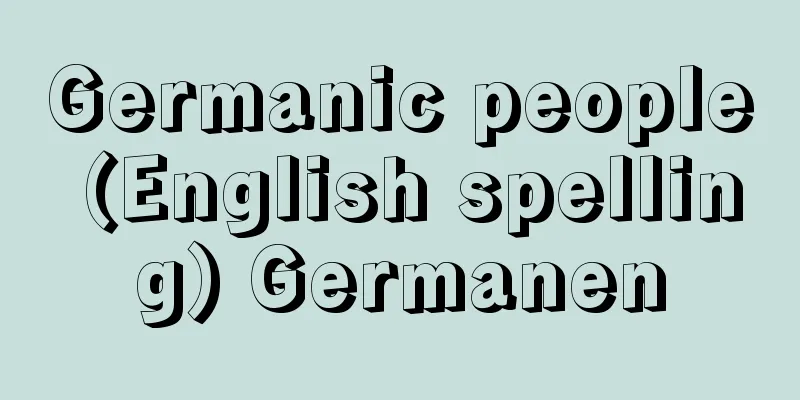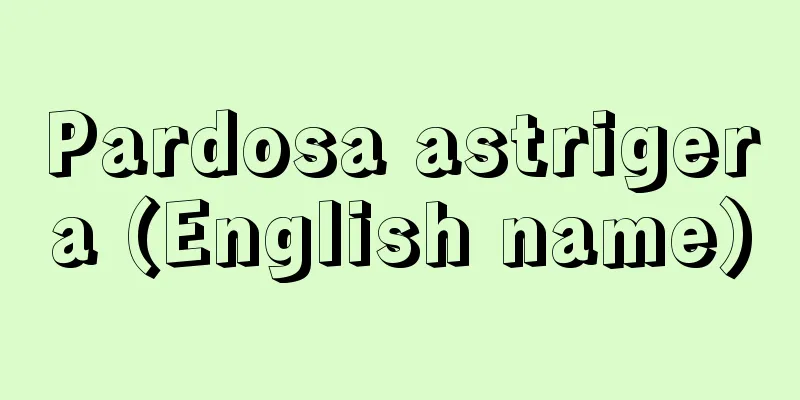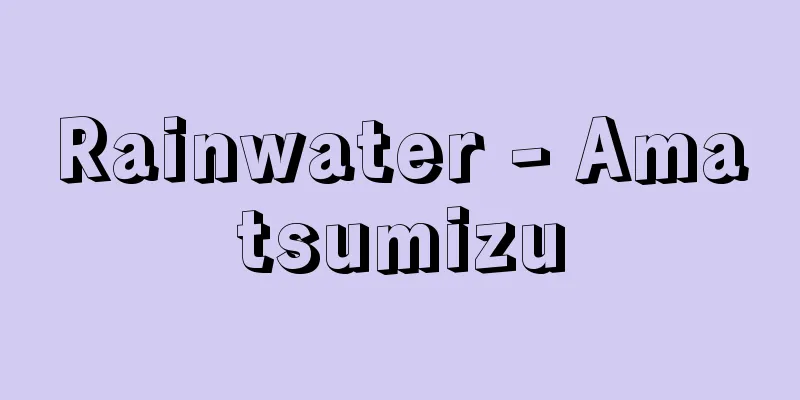Germanic people (English spelling) Germanen

|
A general term for people who speak languages belonging to the Germanic branch of the Indo-European language family. The current Danes, Swedes, Norwegians, Icelanders, Anglo-Saxons, Dutch, Germans, etc. belong to this group, but it often refers to the ancient Germanic people before the Great Migration, who are thought to be the ancestors of these peoples. The Jutland Peninsula and the adjacent northern and northern Germany, as well as the central and southern Scandinavian Peninsula, are thought to be the original habitat of the Germanic people in the mid-2nd millennium BC, but by the mid-1st millennium BC or around the 3rd century BC, their habitat spread westward from the Netherlands to the lower Rhine River, and eastward from the Wixel (Vistula) River basin to the north bank of the Danube River and the lower Dnieper River basin, forming three groups: North Germanic, West Germanic, and East Germanic. Records by classical writers such as Caesar's "Commentaries on the Gallic Wars" and Tacitus's "Germania" provide some concrete information about the social structure and political organization of the Germanic people around the time of Christ. There is no doubt that the Germanic people were already settled and engaged in agriculture at this time, but it is believed that animal husbandry played a significant role in addition to agriculture. In terms of hierarchy, they were divided into freemen, semi-freemen, and slaves, and the upper echelon of freemen formed a class of noble families based on political privileges and large land ownership. Politically, they were divided into small units called kivitas, which were further divided into one or several pargus. Above the kivitas was an organization called gens (tribes), but in Tacitus' time this was thought to have been a kind of ritual organization rather than a political unit. The political system of the Kiwits still strongly retained the vestiges of primitive democracy, and important matters such as war and peace were decided by a popular assembly made up of all free people, but on the other hand, the centralization of political power in the hands of nobles had progressed considerably. There were Kiwits with hereditary monarchy and Kiwits ruled by princeps elected by the popular assembly, but even in the latter case, only nobles were chosen as princeps, so the difference between the two was not so great. In the 4th century and after, stimulated by the pressure of the Huns advancing westward, Germanic tribes began a great migration and established states in various parts of Roman territory, but in the process, royal authority centered on military command was strengthened and established, and new tribes were formed as political units. Tribes that appeared during the migration period, such as the Franks, Vandals, Eastern and Western Goths, and Lombards, were all newly formed in this way. [Shosuke Hirajo] "Germania" by Tacitus, translated and annotated by Hisanosuke Izumi (Iwanami Bunko)" ▽ "The Gallic War" by Caesar, translated by Kinji Chikayama (Iwanami Bunko)" ▽ "Study of the Establishment of Western Feudal Society" by Shiro Masuda (1959, Iwanami Shoten) [Reference item] |©Shogakukan "> Germanic peoples just before the Great Migration (around 350) Source: Shogakukan Encyclopedia Nipponica About Encyclopedia Nipponica Information | Legend |
|
インド・ヨーロッパ語族のうちゲルマン語派に属する言語を話す民族の総称。現在のデンマーク人、スウェーデン人、ノルウェー人、アイスランド人、アングロ・サクソン人、オランダ人、ドイツ人などがこれに属するが、これら民族の祖先と考えられる、民族大移動以前の古ゲルマン人をさす場合が多い。ユトランド半島とそれに隣接する北および北ドイツ、スカンジナビア半島の中・南部が、紀元前二千年紀中葉のゲルマン人の原住地と考えられるが、前一千年紀の中葉ないし前3世紀ごろまでに、西方ではオランダからライン川下流域まで、東方ではウィクセル(ビスワ)川流域から、ドナウ川北岸、ドニエプル川下流域まで広がり、北ゲルマン、西ゲルマン、東ゲルマンの三つのグループを形成するようになった。 カエサルの『ガリア戦記』やタキトゥスの『ゲルマニア』など古典古代の叙述家たちの記録により、紀元前後のゲルマン人の社会構造や政治組織について、若干具体的に知ることができる。このころゲルマン人がすでに定着農耕を営んでいたことは疑問の余地がないが、農耕とともに牧畜の占める比重がかなり大きかったと考えられる。階層的には自由人、半自由人、奴隷に分かれ、自由人の上層部は政治的特権と大土地所有を基礎にして、豪族層を形成していた。政治的には、キーウィタースとよばれる小単位に分かれ、キーウィタースはさらに1ないし数個のパーグスに分かれていた。キーウィタースの上にゲンス(部族)とよばれる組織体があったが、タキトゥスの時代にはこれは政治上の単位ではなく、一種の祭祀(さいし)団体であったと考えられる。キーウィタースの政治体制は、まだかなり強く原始民主制の名残(なごり)をとどめており、全自由民の構成する民会が戦争、平和などの重大事項を決定したが、他方、豪族層への政治権力の集中化も相当進んでいた。世襲王制をとるキーウィタースと、民会で選出されるプリンケップスに統治されるキーウィタースとがあったが、後者の場合も、プリンケップスに選ばれるのは豪族に限られ、両者の相違はそれほど大きなものではなかった。 4世紀以降フン人の西進による圧迫に触発されて、ゲルマン系諸民族は大移動を開始し、ローマ領内の各地に建国するが、その過程で軍事指揮権を中核とした王権の強化・確立と、政治単位としての新しい部族形成が行われた。民族移動期に登場する、フランク、バンダル、東・西ゴート、ランゴバルドなどの部族は、いずれもこのような新しく形成された部族である。 [平城照介] 『タキトゥス著、泉井久之助訳註『ゲルマーニア』(岩波文庫)』▽『カエサル著、近山金次訳『ガリア戦記』(岩波文庫)』▽『増田四郎著『西洋封建社会成立期の研究』(1959・岩波書店)』 [参照項目] |©Shogakukan"> 民族大移動直前(350年頃)のゲルマン… 出典 小学館 日本大百科全書(ニッポニカ)日本大百科全書(ニッポニカ)について 情報 | 凡例 |
<<: Germanic Mythology - Germanic Mythology
>>: Kermanshah - Kermānshāh (English spelling)
Recommend
Ohozaki ayame - Ohozaki ayame
…It is a perennial plant of the Costus genus of t...
Trionyx gangeticus (English spelling)
…[Shinichi Suzuki]. … *Some of the terminology th...
Bridge station - Kyojo station
A type of station with a station building on a bri...
Kunyozushiki - Konyozushiki
The most outstanding world geography book from the...
Tai people - Tai (English spelling) Dai
A minority ethnic group of Dai living in the south...
Embolism
In vascular systems (blood vessels and lymphatic ...
Toji-in Temple
A temple of the Tenryuji school of the Rinzai sec...
Autotransformer - tanmakihenatsuki (English spelling) autotransformer
A transformer with only one winding wound around ...
Breast milk - Bonyu
It means "mother's milk". From the ...
Picturesque (English spelling)
An aesthetic concept used mainly in 18th-century E...
Empty handwriting - karategata
〘noun〙① A bill issued simply as a means of lending...
Fees - Yakuryo
The Edo Shogunate's official salary. In order...
Marazzoli, M.
…The Roman School's religious music was deeme...
Female full moon
...On the fifteenth night of the eighth month of ...
Shiranamimono - Shiranamimono
A general term for storytelling, kabuki, and other...









